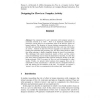Free Online Productivity Tools
i2Speak
i2Symbol
i2OCR
iTex2Img
iWeb2Print
iWeb2Shot
i2Type
iPdf2Split
iPdf2Merge
i2Bopomofo
i2Arabic
i2Style
i2Image
i2PDF
iLatex2Rtf
Sci2ools
119
click to vote
APCHI
2004
IEEE
2004
IEEE
Designing for Flow in a Complex Activity
One component of a user's interaction with computer systems is commonly referred to as `flow'. Flow is an important consideration in interactive system design as it encapsulates some of the affective aspects of human behavior. The majority of current thinking conceptualises flow as a desirable and somewhat enduring emotional state that a user may enter during an activity. Analysis of data from 59 users engaged in an interactive online learning task contradicts this prevailing view. We show firstly that flow, rather than being enduring, is highly changeable during the term of an interaction. This challenges both current theoretical models of flow, and the current research methodology used to study the phenomenon. Secondly, we show that flow arises from an engagement either with the interactive artefact or the task being performed. This is an aspect of flow not well distinguished in other studies. Finally, we present initial analysis that suggests flow can be undesirable in so...
APCHI 2004 | Flow Arises | Human Computer Interaction | Online Learning Task | Thinking Conceptualises Flow |
Related Content
| Added | 20 Aug 2010 |
| Updated | 20 Aug 2010 |
| Type | Conference |
| Year | 2004 |
| Where | APCHI |
| Authors | Jon M. Pearce, Steve Howard |
Comments (0)

